 What I knew of this guy was the ten-dollar bill and some vague facts about his being a money guy and being aligned with the revolution faction who wanted kings more than presidents. Not a romantic enough image to make me dig for more. And, of course, a broadway musical–particularly a rap musical– is certainly not the most scholarly way into the life of an historical figure. But I sit here today having experienced an awakening of many colors.
What I knew of this guy was the ten-dollar bill and some vague facts about his being a money guy and being aligned with the revolution faction who wanted kings more than presidents. Not a romantic enough image to make me dig for more. And, of course, a broadway musical–particularly a rap musical– is certainly not the most scholarly way into the life of an historical figure. But I sit here today having experienced an awakening of many colors.
The tension existed in Hamilton’s personal life in that he was a real hothead who could never leave an argument alone and who felt personal slights deeply even when the slights weren’t meant personally. Chernow suggests strongly that his tarnished origins and the persecution he suffered for them made him super-sensitive. When Washington was alive and near to him, he helped temper Hamilton’s excesses. Once the great Father was gone, he wrote reams and reams in response to even trivial insults.
He influenced for good or ill every major figure in the Revolution. He drew close to some, fought with some. He was buddy-buddy, for example, with Madison when they teamed up on The Federalist Papers, then drew apart when the nation split into Federalists (Adams, Hamilton etc.) and Republicans (Jefferson). The Federalists (in the most general terms) were opting for a strong central government, the Republicans for more decentralization. It’s a tension that still exists, of course, and it played out in multiple ways during the early years.
He was a workaholic who married a wonderful woman (A couple of the most fetching pieces in the show have to do with her and Eliza and her sister, Angelica, with whom Hamilton may, just may, have enjoyed a menage-a-trois.) and fathered eight children. He was a handsome gent who did have an affair or two. He wrote, lawyered, soldiered, and held a number of appointed offices. And he died young. 49, the victim of his own hypersensitivity and temper.
Dueling was an important part of the culture, unfortunately. Hamilton even had a son who was killed in an “affair of honor.” Yet, he put himself into just such danger only a couple of years after his son’s death. And over nothing, not just from a modern perspective, but from that of many of his contemporaries. He made a disparaging remark or two about Aaron Burr at a dinner party. Someone who overheard it, gave Burr a distorted version. Burr demanded an apology, though he didn’t quote the remark. Hamilton demanded that he give him an exact quote so that he could confirm, deny, or apologize. Burr couldn’t/wouldn’t. Friends offered Hamilton honorable ways out. He took none of them. Rowed from New York to New Jersey and got himself killed.
Thus do our commitments to codes and creeds over good sense lead us into self-destructive paths.
Hamilton was too abrasive and too inflexible to ever be president, so he never reached the stature of some of the other revolutionary luminaries. But he deserves higher praise than he every enjoyed. Ironically, here he is strutting before the masses 350 years later. A bit late, but not too shabby. They say he had a hell of a voice.
P.S.: A word about Thomas Jefferson. In David McCulloch’s biography of John Adams, the lord of Monticello did not come off well. Essentially, he seemed to be an asshole who wrote well. In this work, he comes off even worse. He’s a coward, a liar, and a hypocrite of the highest order. Sally Hemmings is the least of his sins.
